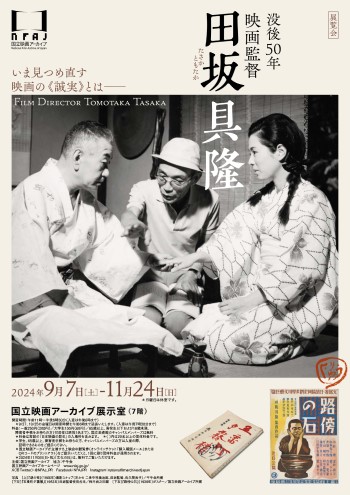Film Director Tomotaka Tasaka

- Location
- Exhibition Gallery (7th floor)
- Date
- September 7 -November 24, 2024
- Hours
- 11:00am – 6:30pm (admission until 6:00pm)
* September 27, October 25 (all Fri) : 11:00am – 8:00pm (admission until 7:30pm) - Closed
- Mondays
- Admission
- Regular¥250 (Group Admission ¥200) / University & College Students ¥130 (Group Admission ¥60)
*Free for Seniors (age 65 or over), High School Students and under 18, Disabled People (with one companion)
*By showing NFAJ’s screening ticket or purchase confirmation email for online ticket, Group Admission fee will be applied.
*Free on November 3, Culture Day.
For more detailed information, please see the following page (in Japanese) .
A name that cannot be forgotten when considering the rich history of Japanese cinema is that of master director Tomotaka Tasaka (1902-1974). Making his debut in 1926 with Kabocha sodoki, Tasaka came to establish a deeply humanistic style with literary works such as Shinjitsu ichiro (1937) and Robo no ishi (1938). He and Tomu Uchida were the forces behind the arrival of Nikkatsu Tamagawa Studio’s heyday. With Five Scouts (1938) and subsequent works, he gained considerable fame as a maker of war films known for their vibrant realism and empathy.
In August 1945, Tasaka was exposed to the atomic bombing in Hiroshima and spent several years fighting associated health effects. However, after recovering, he worked at several studios, nurturing stars such as Yujiro Ishihara, Kinnosuke Nakamura, and Yoshiko Sakuma. He also left behind many masterpieces, including The Maid’s Kid (1955), A Slope in the Sun (1958), A Carpenter and Children (1962), and A House in the Quarter (1963).
Despite his brilliant body of work, Tasaka has long gone without the kind of career reassessment enjoyed by other directors. However, his style, which consistently took notice of the small and the weak, bursts with encouragement for those trying to live lives of goodness and sincerity. It should shine particularly bright in this age of continuous calamity and increasing social intolerance. This year, which marks half a century since Tomotaka Tasaka’s death, and in conjunction with the publication of a book about his life, the National Film Archive of Japan will present the first retrospective exhibition of his works, showing valuable materials provided by people concerned, and host special screenings of his films. We hope it will be an opportunity to take a fresh look at movies and the human lives lying beyond them through Tasaka, a genuine believer in human goodness.
